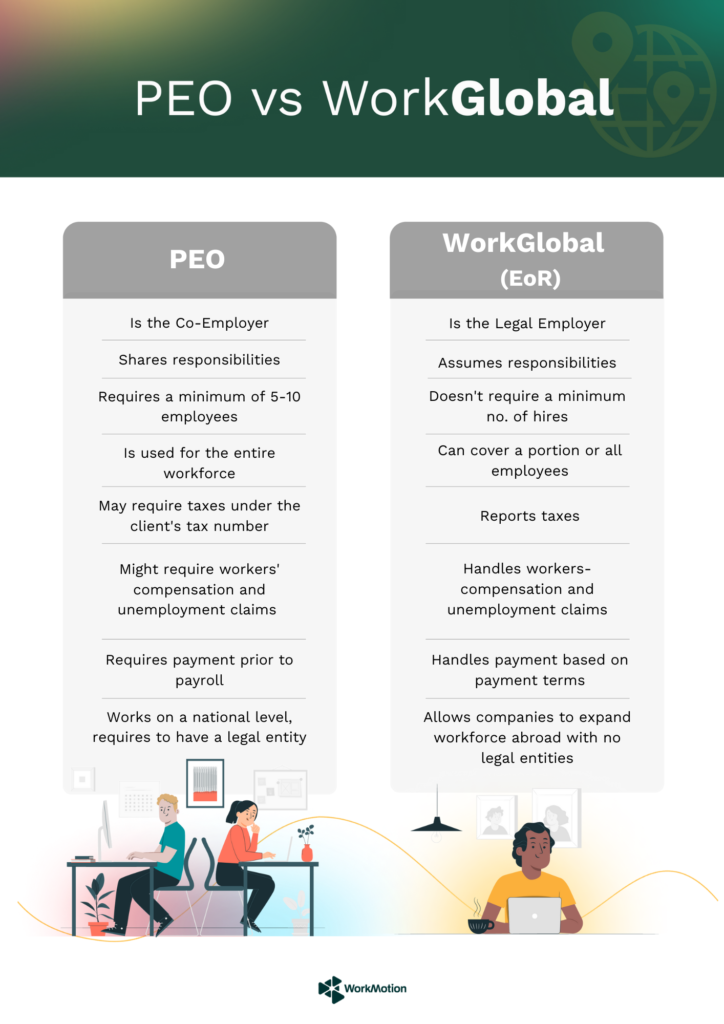Employer of Record vs PEO: Choose the ideal service for your company
Date
Reading Time

While pondering the best solution to hire globally, or while checking our Index, you might have read about PEO — its concept is similar to the one of EoR. In fact, a Professional Employer Organisation and an Employer of Record are both outsourcing services that provide talent onboarding and HR management.
Navigating the sea of global hiring is a tedious task. We’re here to arm you with all the necessary information to choose the service that best fits your onboarding and talent management needs.
Dealing with the bureaucratic, financial and legal aspects of a team is not easy. There’s payroll, taxes, benefits, leaves, compliance and more. Even on a national scale, making sure that everything functions seamlessly is complicated.
It is estimated that HR administrators lose an average of 14 to 30 hours a week manually completing tasks that could be automated. To save time and effort, both EoR and PEO would help you fasten and agile your people management processes.
Still, there are some differences between the two to consider.
A standard PEO vs WorkGlobal: Local VS Global
As an employer, if you’re not interested in expanding your market of influence to a global scale, then a PEO may be your ideal solution.
However, if you want to extend your team internationally, you have to consider the additional challenges involved. These include setting up a legal entity, filing taxes abroad and interfacing with local regulations in a foreign language.
PEOs mostly handle HR functions for businesses that already own entities. On the contrary, WorkDirect can open a business registration on your behalf without the necessity to open your own legal entity.
An EoR, like our WorkGlobal solution, manages everything that regards your international employees: from legal issues to social contributions. At the same time, it also simplifies your company’s global HR management and grants seamless onboardings.
Benefits of choosing WorkGlobal, both an EoR and a global PEO
WorkGlobal, our EoR solution, can onboard employees in any country of your choice. Without the need to open a legal entity, you can explore different international markets while ensuring full compliance with local law. And it doesn’t matter if you want to hire in one or ten countries, just one or one hundred employees.
Let’s discuss some of the motivations that would guide your choice:
Integrations
Thanks to the WorkMotion software, all processes regarding your talent are automated. This also makes them really fast. You can have a complete overview of your talent details at a glance or ask and approve leaves in a single click. Furthermore, an automated EoR like WorkMotion boasts software integration with the most rewarded partners in the HRtech ecosystem, like Personio or HiBob.
Business registration
WorkMotion doesn’t require you to open your legal entity in a foreign market. You have two choices:
- hire globally using WorkGlobal (EoR) or
- be the direct employer of smaller teams abroad via WorkDirect, a unique product in the market. WorkDirect permits you to expand, before pondering if the costs of opening a foreign branch are actually worthwhile.
No Limitations
Standard PEOs normally charge fees on a percentage of the employee’s salary. They also normally focus on small and medium-sized companies, and set a minimum number of employees for every contract (normally around 10).
With Workmotion’s solutions, youl have no limits to the number of talent or the country they belong to. If you hire more employees, the rates will decrease per talent.
Compliance
If you want to cross borders, WorkGlobal’s setup is specifically designed to handle and overview international compliance issues.
A PEO is based on a co-employment model. That means they share with your company the responsibilities of managing the talent. Another difference with PEOs is that they don’t offer insurance coverage, which is instead a legal requirement in all EoR offerings.
Conclusion
To sum up, PEOs may be a better choice if you need a talent management system that would act in your own local branch. Focusing on a national scale, they may offer more flexibility and variety when customising services or benefits.
However, we are able to manage your international employees even if you decide to open a legal entity abroad. WorkMotion can in fact be considered a Global PEO: an EoR that offers all PEO services, with the additional benefits of ensuring compliance, an automated process and the opportunity to hire talent on a global scale.

difference between Professional Employer Organization and WorkGlobal
Latest articles

Overcoming talent shortage in Germany with global hiring

10 awesome remote work rituals you should implement in 2024
